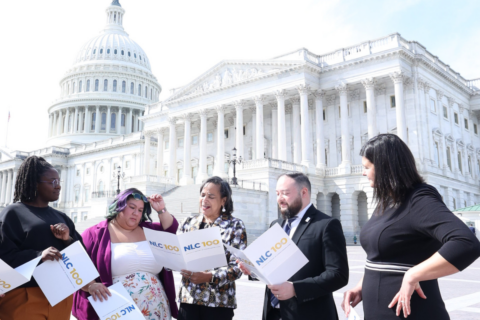Written in collaboration with Sharon Bean M.P.A., Camden County Jail Population Manager.
Young Adults Require Tailored Services
While youth in the juvenile justice system regularly have access to much-needed services due to their age, and older adults, often, have life experiences and/or education to help facilitate a transition back to the community, young or emerging adults often are left without the support or skills needed to succeed post-incarceration. As a mentor in the District of Columbia jail’s Young Men’s Emerging (YME) unit, I witnessed firsthand how crucial specialized services are for young adults (people aged 18-24, but the range can vary depending on the jurisdiction) impacted by the criminal justice system. YME is a specialized correctional unit located in the Washington D.C. jail designed to empower the individuals currently incarcerated to mentor the younger population and help them navigate the uncertainty of the justice system, life as a justice-involved young adult and what lies ahead.
A year and half after providing mentorship at YME, upon my return from a federal sentence, I was housed in D.C.’s now defunct halfway house with one of my mentees. In talking to him, I found that all the specialized support he had as part of YME fell to the wayside once he was released. A young man with no high school diploma, no job history, and no stable housing options was put into the same general pool as everyone else and left to fend for himself.
His experience is one reason why the National League of Cities set out to research the landscape for reentry services at the local level across the country in 2021. Unfortunately, there were few cities addressing reentry for young adults specifically. Since that time, there has been some movement and traction across the country, starting with the acceptance of the brain science that shows the cognitive abilities for most people are not fully developed into the mid to upper 20s. Additionally, last year, NLC partnered with Loyola University’s Center for Criminal Justice Research, Policy and Practice to produce the Young Adult Justice: A National Scan, a comprehensive nationwide inventory of policy and practice in the young adult justice continuum. In this report, you can find examples of promising practices cities can adopt to assist young adults at the intersection of the criminal justice system. Most importantly, it takes the position that:
While specialized reentry supports are needed for those young adults who are incarcerated, investment in high-quality, developmentally tailored alternatives to incarceration are more likely to achieve positive results for individual young people, their families and our communities.” In other words, the best reentry is no entry into the criminal justice system. In lieu of no entry, cities can implement housing practices that increase the chances that a young adult will have successful transition back into their community.
Young Adult Justice: A National Scan
A Promising Solution to Young Adult Reentry Housing
Young adults returning home from incarceration, specifically at a local jail, face many challenges, obstacles, and hardships regardless of the length of time away from home. Unlike prisons, there is rarely advanced notice of when the release will occur from a jail, making it difficult to arrange for housing. While there are some resources available to individuals to assist with housing once released, they are often not immediately accessible.
One city that has invested in youth and young adult reentry services is Camden, New Jersey. As part of a four-city investment from the state of New Jersey that supports holistic, cross-system support for young adults that aims to ease their transition and center healing, Camden used a pilot program to launch the Restorative Justice Hub and has continued to think outside of the box to improve transitional services amongst their young adult returning citizens. As is the case in cities throughout the country, one of the single largest barriers to reentry they have identified is housing insecurity. In 2023, there were 7,301 admissions to the Camden County Correctional Facility (CCCF) and at least 548 (eight percent) self-reported experiencing homelessness at the time of arrest, a three percent increase from 2022. They also recognized that this one measure does not give the complete picture as many more individuals become homeless while incarcerated. After many years of troubleshooting access to housing for individuals leaving jail and implementing strategies with their community partners, the city/county realized that more needed to be done.
In addition to the Restorative Justice Hub, the Camden County Department of Corrections partnered with a community-based non-profit to establish a Reentry Transition Housing Program (RRHP) in 2022. The RRHP is a resource for individuals leaving the CCCF who have no place to go and without this program would be on the streets. The program, which is intended to be short-term with an expected length of stay of three months is run in close partnership with the Camden County Department of Corrections and a community provider beginning with referrals, placement, and program discharge. A Residential Reentry Specialist is assigned to work with the residents to identify both short- and long-term goals related to housing, employment, substance use and mental health treatment, obtaining vital documents, education, and family reunification. With just over a year of operation, more than half of the residents have successfully transitioned to more stable housing. The Department of Corrections will often provide transportation from the jail to the RRHP to ensure individuals make it to the home, removing the barrier of finding transportation.
What Steps Can Cities Take?
Camden’s model is certainly one that can be replicated in almost every community. As the Camden County Department of Corrections (NJ) Jail Population Manager for the past 7 years, Sharon Bean believes local leaders looking to stand up reentry services for young adult returning citizens can:
- Create spaces to think differently about possible solutions
- Establish relationships with community partners
- Secure the support of leadership
- Reallocate existing resources to test and prove effectiveness while identifying long-term sustainable funding.
Learn More
For more information on strategies and actions your community can take to increase housing opportunities for returning citizens, read How Cities Can Create Housing Solutions for Returning Citizens.
If you are a city reentry leader looking to network with peers in other jurisdictions across the country, we invite you to join NLC’s Municipal Reentry Leaders Network.








